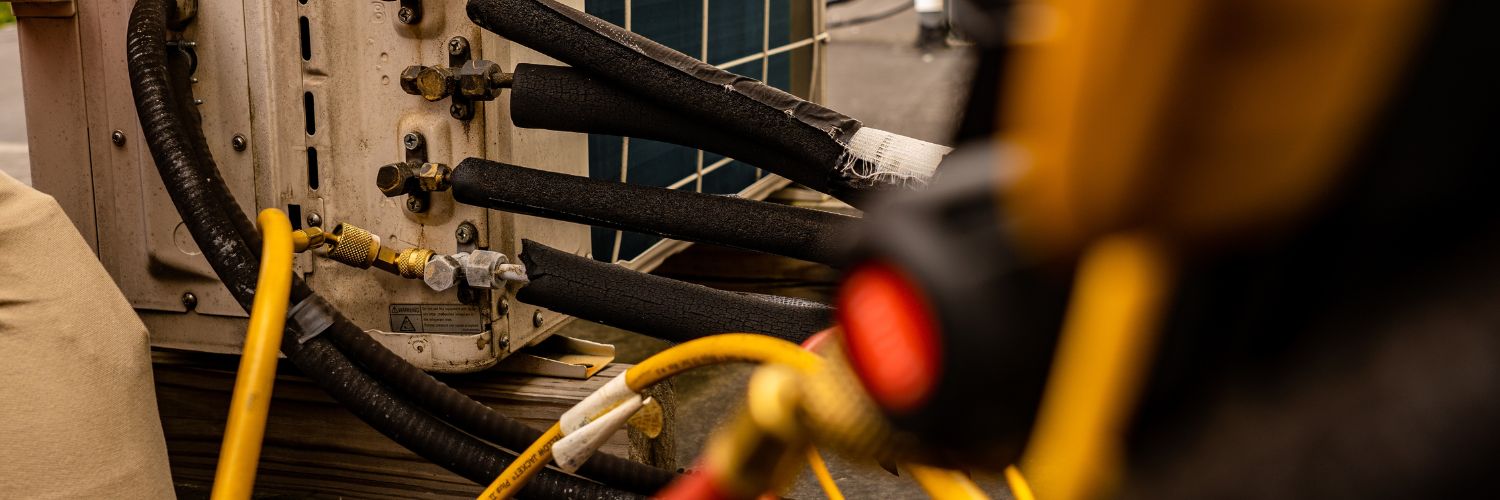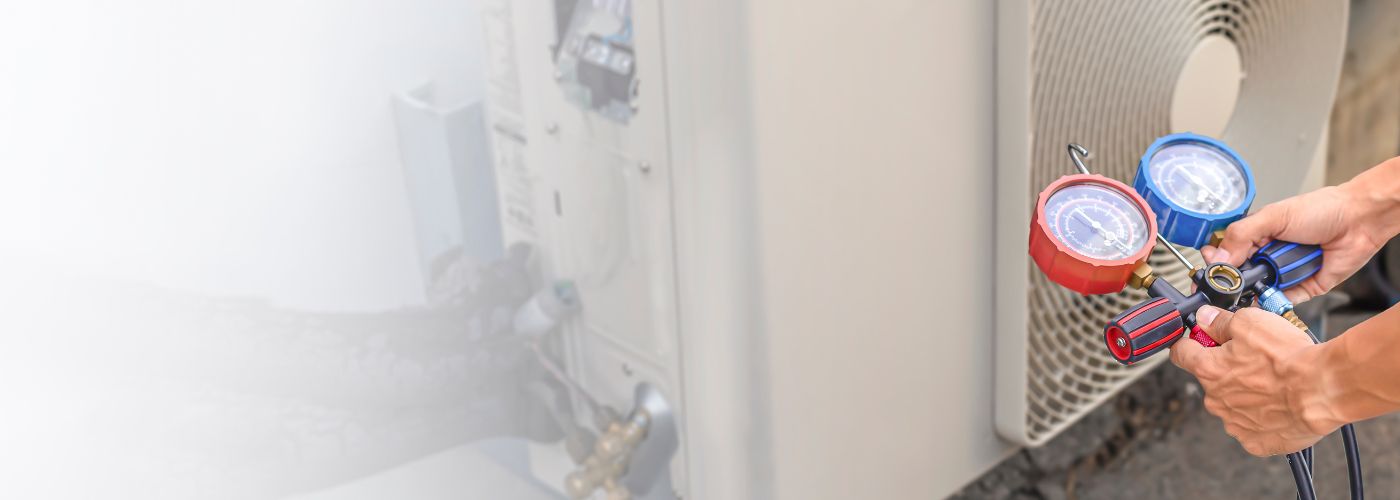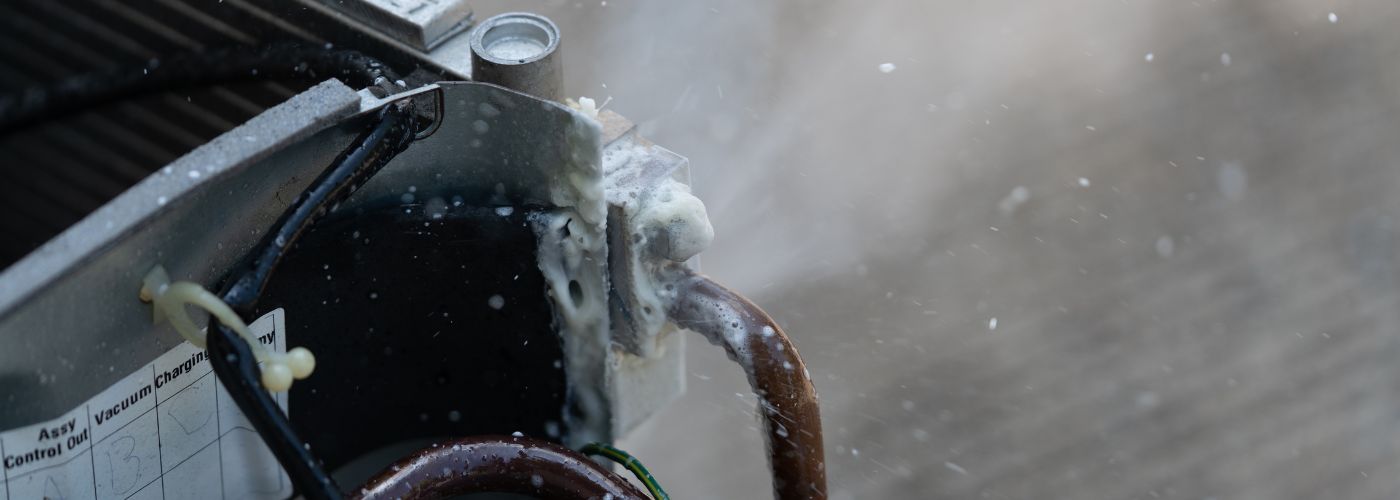When it comes to keeping your home cool and comfortable, the air conditioning (AC) system plays a vital role. One common issue that can compromise the efficiency of your AC is refrigerant leaks.
In this guide, we’ll delve into the ins and outs of AC refrigerant leaks, helping you understand how to detect them, address the issue, and grasp the potential dangers associated with significant leaks.
How To Tell If An AC Is Leaking Refrigerant

AC issues can be concerning, but the good news is that by recognizing warning signs of an HVAC issue, you have a chance to protect both your system and home with early air conditioning repair. Here are some key elements to watch out for:
Reduced Cooling Performance: One of the primary indicators of a refrigerant leak is a noticeable decline in the cooling efficiency of your AC. If your home doesn’t feel as cool as it used to, a refrigerant leak may be the culprit.
Hissing or Bubbling Sounds: Listen for unusual sounds coming from your AC unit, such as hissing or bubbling. These noises could signify a refrigerant leak. If you notice any unusual sounds, it’s essential to investigate promptly.
Ice Accumulation on the Refrigerant Line: Inspect the refrigerant line. If you observe ice accumulation, it might be a sign of a refrigerant leak. The refrigerant is not flowing properly, causing the line to freeze.
Higher Electricity Bills: A refrigerant leak forces your AC system to work harder to achieve the desired temperature, resulting in increased energy consumption. If you see a sudden spike in your electricity bills without a corresponding increase in usage, it could be a red flag.
Warm Air Blowing from Vents: If the air blowing from your vents feels warmer than usual, a refrigerant leak might be causing the system to struggle in maintaining the desired temperature.
How To Fix A Refrigerant Leak In An AC

Addressing a refrigerant leak requires professional HVAC services. Make sure you take full advantage of tips for picking the right HVAC contractor for your home to ensure the project is completed properly and safely! Here’s what the repair process may involve:
Identifying the Leak: HVAC technicians use specialized tools to detect the location of the refrigerant leak. This often involves pressurizing the system and using detectors to pinpoint the source.
Repairing the Leak: Once identified, the technician will proceed to repair the leak. Depending on the severity and location, this may involve patching a small leak or replacing a damaged component.
Recharging Refrigerant: After the leak is fixed, the HVAC technician will recharge the system with the correct amount of refrigerant. This ensures that your AC can resume optimal cooling performance.
Inspecting and Testing: A thorough inspection and testing of the entire system follow the repair. This ensures that the leak has been successfully addressed, and the AC is functioning as intended.
What Causes A Refrigerant Leak In An AC?
Over time, the components of an AC system may experience wear and tear, potentially leading to leaks. As with keeping any part of your AC running smoothly, from addressing bad motor blower resistors to dirty AC coils, regular maintenance can help identify and address issues before they escalate.
Corrosion or rust on the refrigerant lines or coils can create weak points, making them susceptible to leaks. This is more common in older systems or those exposed to harsh environmental conditions.
Occasionally, manufacturing defects in components or joints can lead to refrigerant leaks. This is why proper installation and quality equipment are crucial. Accidental damage during home renovations, landscaping, or other activities near the AC unit can also result in refrigerant leaks. It’s essential to exercise caution around your AC system!
Why Is A Large Refrigerant Leak Potentially Dangerous?
Refrigerants used in AC systems can be harmful if released into the air. Breathing in refrigerant fumes may cause respiratory issues, dizziness, or nausea. Large leaks should be addressed promptly to mitigate health risks.
Certain refrigerants, such as chlorofluorocarbons (CFCs) or hydrochlorofluorocarbons (HCFCs), also have detrimental effects on the ozone layer. Large refrigerant leaks contribute to environmental damage and are subject to regulations for proper handling and disposal.
A significant refrigerant leak can lead to irreparable damage to your AC system. Components like the compressor may suffer, resulting in costly repairs or the need for a complete system replacement.
Understanding the signs of refrigerant leaks, seeking professional assistance, and addressing the issue promptly can safeguard your AC system’s performance and the well-being of your home.
Regular maintenance and timely repairs not only enhance cooling efficiency but also contribute to the longevity of your HVAC system. If you suspect a refrigerant leak or encounter any issues with your AC, don’t hesitate to reach out to experienced HVAC professionals for a comprehensive inspection and expert assistance!
